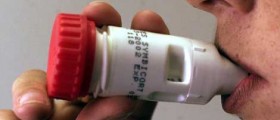
There are many conditions associated with chest congestions. Most of them affect the lungs while others initially affect upper respiratory tract and then spread to the lungs. The problem develops due to accumulation of mucus inside the airway.
Chest congestion is typical for several lung conditions including bronchitis, pneumonia and tuberculosis. Bronchitis represents inflammation of the bronchial tubes. The inflammation is responsible for swelling of the mucous membrane of the affected bronchial tubes and excessive production of mucus. The mucus may be very stocky and difficult to remove. This eventually leads to chest congestion. In pneumonia inflammation affects both the bronchial tubes and the lung tissue. Similarly to bronchitis the airway gets filled with mucus which is a cause of congestion. And finally, people suffering from tuberculosis of the lungs may develop chest congestion.
Common cold, flu and sinusitis are medical conditions that primarily affect the upper respiratory tract but may be associated with chest congestion. All of them cause excessive production of mucus inside the sinuses and nasal cavity. The mucus may descend into the lungs and cause congestion or the infection spreads to lower portions of the respiratory tract and cause inflammation with subsequent excessive mucus production.
And finally, it is important to mention chest congestion associated with allergies. Exposure to certain allergens is generally connected with itchy eyes, runny nose and nasal congestion. However, some allergens may also irritate the lungs and cause chest congestion. There are many types of allergies and those capable of causing chest congestion include allergy to pollen, dust or other airborne particles.Treatment for Chest Congestion
The first step of chest congestion treatment is to identify the underlying cause or the illness that has led to chest congestion. The underlying conditions are treated with suitable conservative treatments, most commonly with medications. Furthermore, intake of plenty of fluids is essential. This way the mucus becomes less viscous and can be easily coughed out. And finally, majority of patients suffering from chest congestion are prescribed with a cough expectorant, a drug that can effectively loosen mucus and make its elimination much easier.

















Your thoughts on this
Loading...